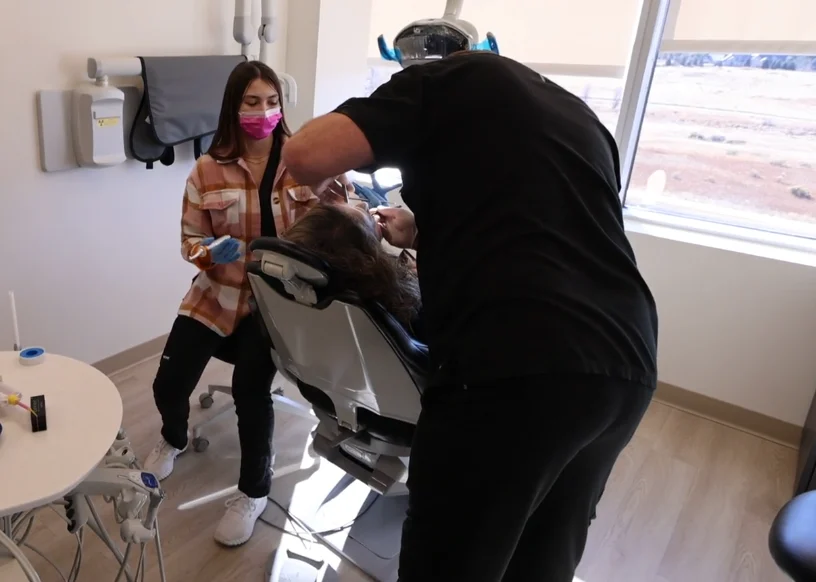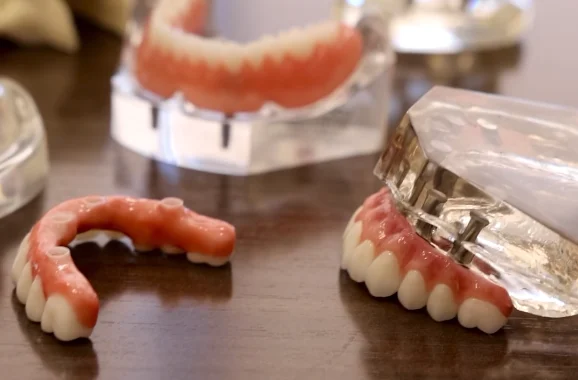The short answer is, yes, you can get dental implants if you have osteoporosis. Osteoporosis happens when bone density decreases, making bones weaker and more prone to breaking. This condition often develops during postmenopause due to the natural decline in estrogen levels, a hormone that helps cells generate new bone.
Dental implants involve having an oral surgeon insert a new tooth root into your jawbone. This implant is made of titanium or zirconium oxide, both durable and biocompatible metals.
After placing the implant, our expert dentist at NuSet Dental Implants and Oral Surgery attaches the tooth to it, replacing the missing tooth. Over time, your bone will naturally grow around the implant, forming a stable and secure joint.
Key Takeaways
- Yes, you can get dental implants if you have osteoporosis, even with decreased bone density.
- Special techniques like bone compression and bone densifying help improve implant stability.
- Bone grafting may be used to strengthen the jawbone for a secure implant.
- Upper jaw implants may utilize alternative anchoring points like the cheekbone.
- A thorough pre-surgical evaluation ensures a safe and successful procedure for osteoporosis patients.
What is Osteoporosis?
Osteoporosis is a condition in which bone density decreases, making bones weaker and more likely to break.
When osteoporosis affects the jawbone, it can lead to problems with tooth stability. The bone becomes softer and less dense, increasing the risk of tooth loss and periodontal disease. These issues can impact the success of dental implants because implants need a strong bone structure to remain stable and secure.
It’s important to note that osteoporosis can be managed effectively. This is why, when you come to NuSet, we ask for your medical history and conduct a thorough oral evaluation before the implant surgery. This information helps us plan and execute dental implant procedures safely and successfully.
Can You Get Dental Implants If You Have Osteoporosis?
While osteoporosis weakens bones and makes them more prone to breaking, dental implants remain a viable option with the right approach and expertise.
Dental implants involve inserting a new tooth root into your jawbone. This implant, made of titanium or zirconium oxide, is durable and compatible with your body. After placing the implant, a new replacement tooth is attached to replace the missing tooth. Over time, your bone will naturally grow around the implant, forming a stable and secure joint.
Techniques Used at NuSet for Dental Implants in Osteoporotic Patients

Special techniques help ensure the success of dental implants in patients with osteoporosis. These techniques include:
Bone compression
Instead of drilling a hole, we press the implant directly into the bone. This method compresses the bone around the implant, making it denser and more stable. By applying pressure, we can enhance the bone’s ability to support the implant. This technique helps create a snug fit for the implant, ensuring it remains securely in place even in bones weakened by osteoporosis.
Bone densifying
We use special drills to compact the bone during the implant process. This technique involves using a series of expanding tools that gradually increase the diameter of the space in which the implant is placed. This compacts the bone tissue and increases its density around the implant.
Connecting teeth
When multiple adjacent teeth are missing, we connect them as one implant. This approach involves placing a bridge supported by implants instead of individual implants for each missing tooth. By connecting the teeth, we distribute the bite force more evenly across the implants.
Specialized implants for the upper jaw
For severe bone loss in the upper jaw, we use alternative anchoring points like the cheekbone (zygomatic bone) or the base of the nose. This technique is especially useful when the upper jawbone is too weak or thin to support traditional implants. By anchoring the implants in these stronger bones, we provide better support and stability. This method allows us to successfully place implants in challenging cases where traditional methods might fail.
Bone grafting
In cases where the jawbone lacks sufficient density or volume to support an implant, we perform bone grafting. This procedure involves adding bone material to the jaw to create a stronger, more robust foundation for the implant.
The bone material can be sourced from another part of the patient’s body or from a synthetic or animal source. Over time, the graft integrates with the existing bone, providing a solid base for the implant.
At NuSet, our expertise and advanced techniques make us a trusted provider for dental implants, even for patients with osteoporosis. We are committed to delivering the best possible outcomes for all our patients, ensuring they receive the care and support they need for successful dental implants.
Achieve a Healthy, Confident Smile with NuSet Dental Implant and Oral Surgery
Dental implants are a viable and safe option for individuals with osteoporosis. Despite the challenges posed by decreased bone density, advancements in dental technology and specialized techniques enable successful implant procedures.
At NuSet Dental Implants and Oral Surgery, we provide high-quality care and ensure patient safety and satisfaction. If you have osteoporosis and are considering dental implants, contact us today to schedule a consultation. Let us help you achieve a healthy, confident smile with our expert dental implant solutions.
Frequently Asked Questions
Can I get dental implants if I have osteoporosis?
Yes, you can get dental implants if you have osteoporosis. With the right techniques and expertise, dental implants can be successfully placed even in patients with decreased bone density. At NuSet Dental Implant Surgery, we use advanced methods such as bone compression, bone densifying, connecting teeth, specialized implants for the upper jaw, and bone grafting to ensure stable and durable implants.
How does osteoporosis affect dental implant success?
Osteoporosis affects bone density, making bones weaker and more prone to breaking. This can impact the jawbone’s ability to support dental implants. However, specialized techniques and careful planning can mitigate these effects. It is crucial to work with a dental implant expert who understands the complexities of osteoporosis and can use advanced methods to enhance implant stability and success.
What pre-surgical evaluations are necessary for osteoporosis patients seeking dental implants?
Before undergoing dental implant surgery, patients with osteoporosis need a thorough evaluation. This includes:
- A comprehensive review of medical history and current medications.
- Bone density scans to assess the condition of the jawbone.
- A detailed dental examination to evaluate the health of the gums and remaining teeth.
- Discussions about any medications, particularly bisphosphonates, as they can impact the jawbone’s healing ability.
These evaluations help us create a personalized treatment plan that addresses all aspects of the patient’s health and ensures the best possible outcome.
Are there any medications for osteoporosis that impact dental implant success?
Yes, medications for osteoporosis, such as bisphosphonates (e.g., Fosamax®, Boniva®), can impact dental implant success. Long-term use of these medications can lead to a condition called osteonecrosis of the jaw (ONJ), where the jawbone fails to heal properly after surgery. It is crucial to inform your dental surgeon about all medications you are taking so they can take necessary precautions and plan your treatment effectively to minimize risks.





